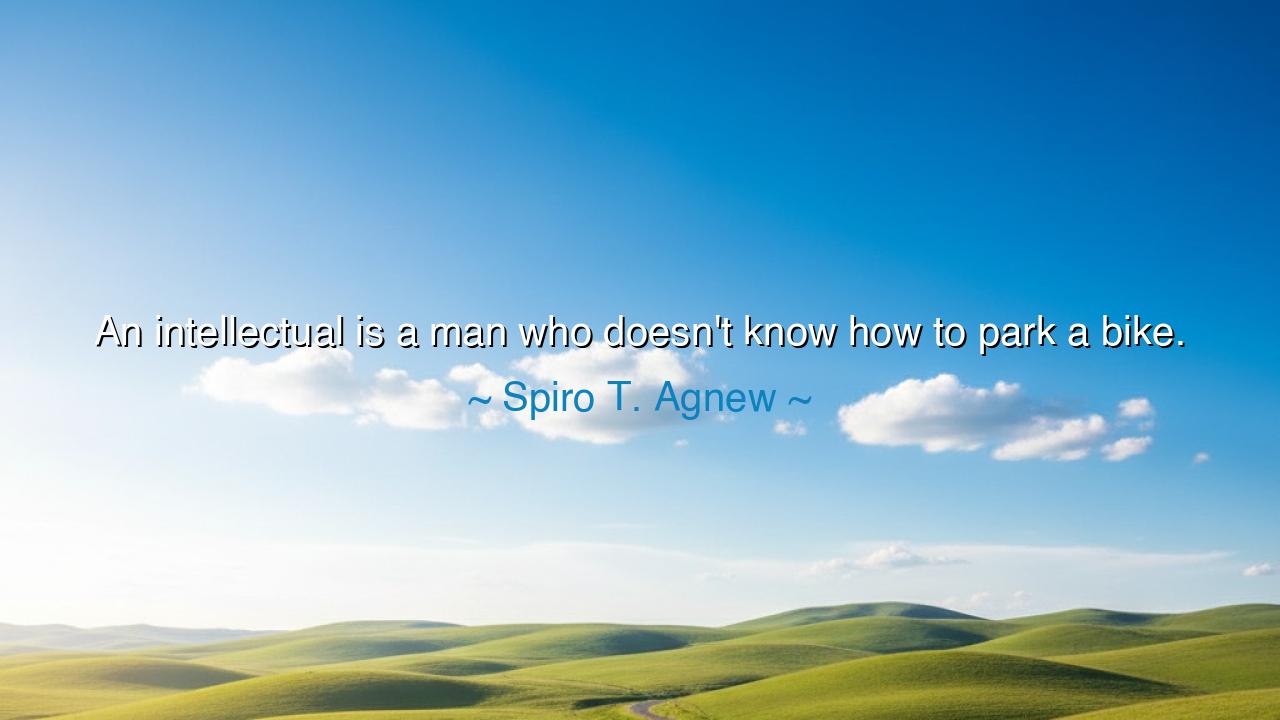
An intellectual is a man who doesn't know how to park a bike.






The Balance Between Mind and Hand
From the sharp tongue of Spiro T. Agnew, former Vice President of the United States, comes this paradoxical yet timeless statement: “An intellectual is a man who doesn’t know how to park a bike.” Though at first it may seem a jest—a passing insult to the scholarly—these words conceal a deeper reflection on the human condition. For Agnew, speaking in an age of political unrest and cultural division, sought to remind the world that intellect without practicality is like a bird with one wing: lofty in thought but unable to rise in life. His words carry a warning that echoes through every generation—the mind that forgets the ground beneath it risks floating into irrelevance.
The meaning of this quote lies not in mockery, but in contrast. The intellectual, in Agnew’s eyes, symbolizes the thinker who lives too much in abstraction—who contemplates the stars but forgets how to light a fire. To “not know how to park a bike” is not truly about bicycles, but about the distance between thought and action, between theory and life. It is a call to humility: the reminder that wisdom must serve the real. For thinking, however brilliant, loses its power if it does not touch the world, if it cannot guide the hands that build, the hearts that labor, the people who live. Thus, Agnew’s words are not a condemnation of thought, but a summons to balance—between knowledge and application, idea and action.
The origin of this statement reflects the tension of Agnew’s time. During the late 1960s and early 1970s, America was divided—between the intellectual elite of the universities and the working class who felt alienated by the rhetoric of complexity. Agnew, who rose as a voice for “the silent majority,” often criticized those who, in his view, spoke endlessly but accomplished little. His quote distilled his belief that common sense and practical wisdom often surpass the cleverness of those trapped in words and theories. While his tone was political, the truth beneath it is universal: a society cannot survive on intellect alone; it must be grounded in useful skill, humility, and action.
History offers many mirrors to this truth. Consider the tale of Diogenes the Cynic, the ancient Greek philosopher who lived in a barrel and mocked the intellectual pretensions of Athens. When Plato defined man as a “featherless biped,” Diogenes plucked a chicken, held it aloft, and declared, “Behold! A man!” His crude wit, like Agnew’s, cut to the heart of the matter: intellect without grounding becomes absurd. For Diogenes, true wisdom was not found in words alone, but in living according to nature, in knowing how to act rather than merely how to speak. Thus, Agnew’s quip echoes an ancient warning—beware the arrogance of those who know everything but understand nothing.
Yet, the teaching here is not to reject intellect, but to anchor it. The world needs thinkers, but thinkers who can also live. Leonardo da Vinci, the most celebrated intellectual of the Renaissance, was no mere theorist. His notebooks overflowed not only with ideas but with the blueprints of flying machines, weapons, and canals. His intellect was not divorced from reality—it served life, art, and invention. He knew how to dream, but he also knew how to build. The true intellectual, then, is not one who avoids the bike, but one who rides it skillfully while imagining the engine within.
Agnew’s statement reminds us that intelligence without humility is hollow. The wise man must never look down on those who labor with their hands, for in their labor lies the foundation of civilization. A scholar may read a thousand books, but it is the farmer who feeds him, the builder who shelters him, the mechanic who moves him from place to place. Thus, the ancient harmony between the mind and the hand, the thinker and the worker, must never be broken. For when intellect scorns practicality, and practicality scorns intellect, the world falls into disarray. The greatest societies—Greece, Rome, and beyond—thrived only when philosophy and craftsmanship walked side by side.
Therefore, O seeker of wisdom, let this be your lesson: do not seek to be clever, but to be capable. Think deeply, but act decisively. Study the stars, yet keep your feet upon the earth. Let your knowledge serve your life, not your pride. If you learn to “park the bike,” to join intellect with practice, then no truth will be beyond your reach. For wisdom is not the hoarding of thoughts, but the art of applying them to the world. The one who can think and act in equal measure becomes not merely an intellectual, but a whole human being—a creator, a leader, and a teacher of generations.
And when your mind soars into high philosophy or grand imagination, remember this: even the greatest thoughts must one day return to the ground, where they can be planted as seeds. Let your ideas bear fruit in the real world. For as Agnew’s words remind us, it is not enough to know; one must also do. To think without action is to drift like smoke; but to think and act together is to live as fire—bright, warm, and enduring.






AAdministratorAdministrator
Welcome, honored guests. Please leave a comment, we will respond soon